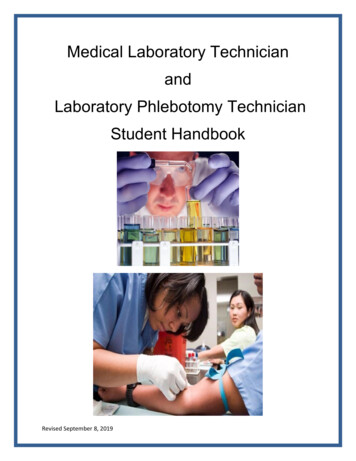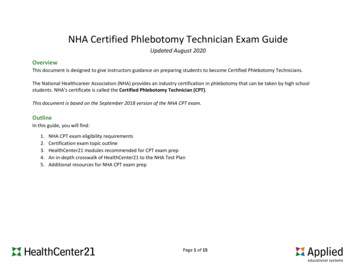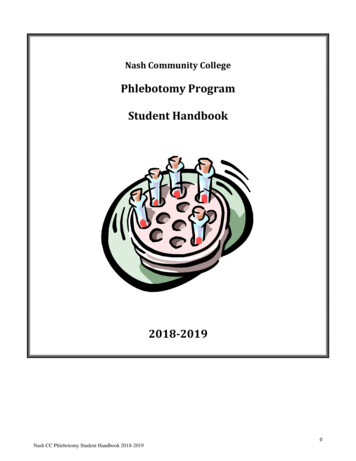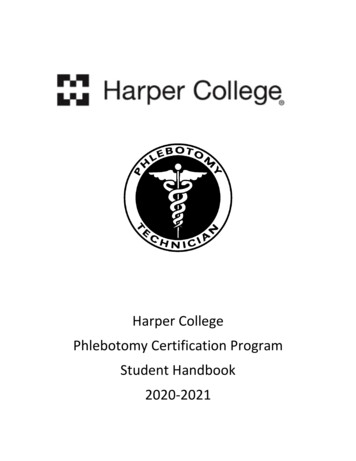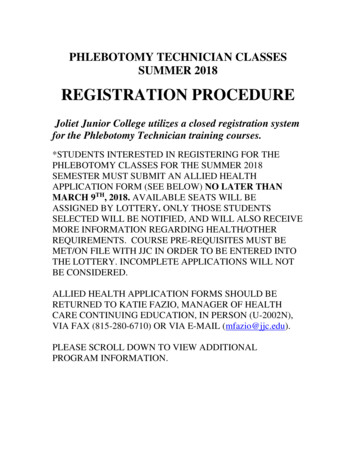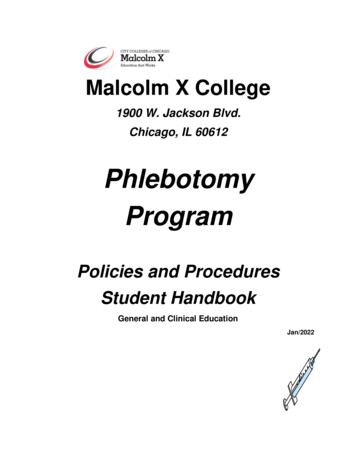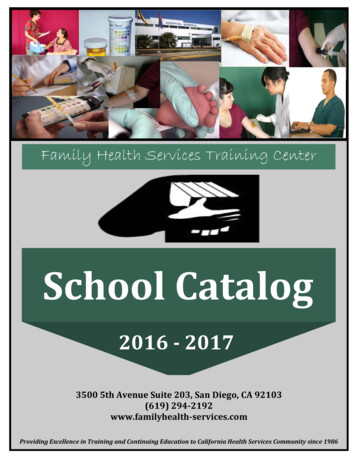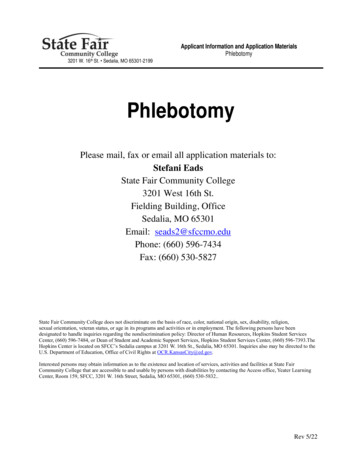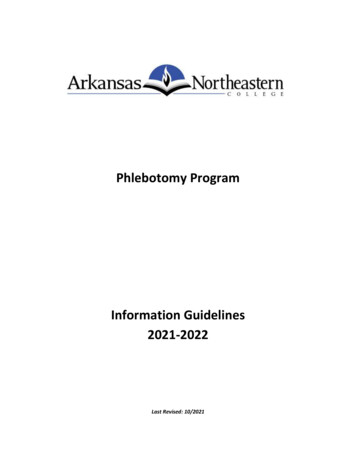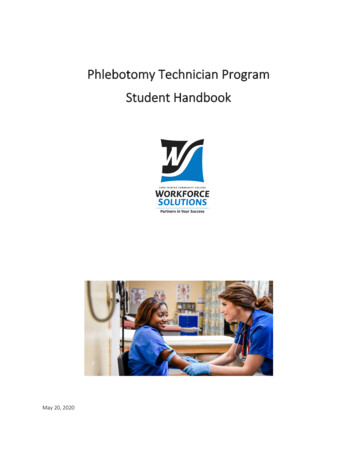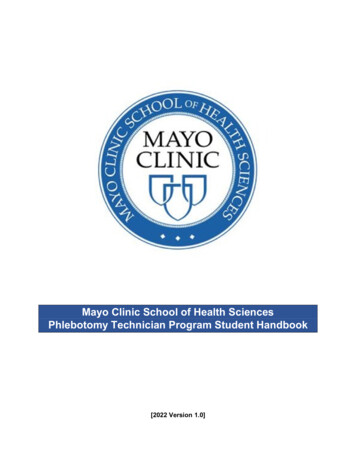
Transcription
Mayo Clinic School of Health SciencesPhlebotomy Technician Program Student Handbook[2022 Version 1.0]
Table of ContentsAccreditation and LicensureIntroductionPolicies and ProceduresProgram DescriptionMission StatementProgram Goals and OutcomesGraduate CompetenciesClinical FacilitiesAdmission CriteriaEssential FunctionsProgram Course DescriptionsCourse Numbering DescriptionUnits of CreditProgram Completion RequirementsProgram FacultyTuition and Fees, including Mayo Clinic Workforce Development ScholarshipWithdrawal and Tuition Refund PolicyService WorkPolicies and Procedures:Academic AdvisingClinical AssignmentsStudent Grievance and AppealsSatisfactory Academic ProgressWarning, Probation, Dismissal and AppealLearner Professional ConductAcademic CalendarAdditional InformationTextbooksAttendance, Tardiness and AbsencesEvaluation and Grading SystemLate AssignmentsDaily Clinical EvaluationsClinical Guidelines and Dress CodeGraduation Requirements and Certification3-445566-78899 - 10111111121212131314 - 15141414151515 - 16161717181919202020The contents of this manual are intended for Phlebotomy Technicianprogram students at Mayo Clinic School of Health Sciences within MayoClinic College of Medicine and Science. Changes to content may occur.Faculty and Phlebotomy Technician program students will be promptlyinformed of changes accordingly.2
Mayo Clinic - Florida4500 San Pablo RoadJacksonville, Florida32224904-953-2000Mayo Clinic - Rochester200 First Street SWRochester, Minnesota55905507-284-2511Mayo Clinic - Arizona13400 E Shea BlvdScottsdale, Arizona85259480-342-2000Mayo Clinic College of Medicine and Science is accredited by the:Higher Learning Commission230 South LaSalle Street, Suite 7-500Chicago, IL 60604800-621-7440The Higher Learning Commission (HLC) is one of six regional institutional accreditors in theUnited States. HLC accredits degree-granting postsecondary educational institutions in theNorth Central region, which includes the states of Minnesota and Arizona.Due to HLC's Policy on Affiliated Institutions (INST.B.10.020), the Mayo Clinic College ofMedicine and Science (MCCMS) campus in Florida receives accreditation through affiliationwith the educational and operational activities on the Rochester campus.Mayo Clinic College of Medicine and Science is accredited by the:State Board for Private Postsecondary Education1740 W. Adams Street, Room 3006Phoenix, AZ 85007Institution is licensed by theFlorida Department of EducationCommission for Independent EducationAdditional information regarding this institution may be obtained by contacting theCommission at:325 West Gaines Street, Suite 1414Tallahassee, FL 32399-0400Toll Free 888-224-6684Institution ID #30143
Program accreditation/approvalNational Accrediting Agency for Clinical Laboratory Sciences5600 N. River Road, Suite 720Rosemont, IL 60018-5119847-939-3597Email: info@naacles.orgIntroductionWelcome to the Mayo Clinic School of Health Sciences (MCSHS) Phlebotomy Technician (PBT)program. The faculty is committed to helping you become successful as you embark on arewarding career as a phlebotomy technician, and we wish you the best as you tackle therequirements of the program. We know that you will learn many new skills during your timehere, and the faculty will certainly benefit from the experience and personal gifts you bring to ourprogram.To help you adjust to student life within the program, take some time to acquaint yourself withthe Phlebotomy Technician Program curriculum located within Blackboard. Blackboard can beaccessed through the online student portal: https://edlink.mayo.edu.To access Blackboard, log in using your assigned username and password. Click on theBlackboard link located on the upper, left hand side of the page. The Phlebotomy TechnicianProgram organization will be listed under “My Courses”. Blackboard contains many resourcesyou will need throughout your time within the program including policies, procedures, and dailyschedules.The faculty is committed to helping you become successful as you embark on a rewardingcareer as a phlebotomy technician, and we wish you the best as you take on the rigors of theprogram. We know you will learn much during your time here, and the faculty will certainlybenefit from the experience and personal gifts you bring to our program. You can expect toreceive a focused, hands-on experience clinical rotation, which may includeobservations, shadowing, and individualized mentorship.4
If you have any questions or need clarification on any of the content contained in this studenthandbook, please contact the Program Director or Assistant Program Director.Rochester CampusErin Peper, MS, PBT (ASCP)CMpeper.erin@mayo.eduProgram Director(507) 284-5781Instructor in Laboratory Medicine and PathologyBaldwin SL 101FFlorida CampusKristy Dawson, MS, MT (ASCP)CM, PBT (ASCP)CMboshela.kristy@mayo.eduAssistant Program Director(904) 953-2130Assistant Professor in Laboratory Medicine and PathologyVincent Stabile 621NArizona CampusMonica Graham, PBT (ASCP)CMgraham.monica@mayo.eduAssistant Program DirectorInstructor in Laboratory Medicine and Pathology(480) 342-4414Support Services Building 2-362College of Medicine and Science Policies and ProceduresThe Learning Management System (Blackboard) used in the Phlebotomy Program provideslinks to Mayo Clinic College of Medicine and Sciences policies and procedures that every studentmust follow, including student grievance and appeals, disciplinary action, etc).Program DescriptionThe Mayo Clinic School of Health Sciences Phlebotomy Technician program is a 9-week coursecomposed of didactic, laboratory and clinical experiences. The curriculum is designed to providestudents with the knowledge and skills necessary for careers working in outpatient/clinic orinpatient/hospital settings. The program provides exposure to a large, diverse patientpopulation, to create a well-rounded, fully competent phlebotomy technician. Included in theacademic curriculum, the students learn medical terminology, basic and advanced venipunctureskills including equipment choices, and collection techniques. Capillary and Point-of-Carecollection methodology is also part of the skills taught. Academic topics include: Anatomy andPhysiology, Pre-analytical Variables, Safety, Infection Control, Bloodborne Pathogens, Difficultcollections, Pediatrics, Hematology, Transfusion Medicine, Non-Blood Specimens, ArterialBlood Gases, Assisted Central Venous Catheter and Arterial Line Collections, Legal Issues andProfessionalism.5
Mission, Vision, Values, Outcomes/Goals and EvaluationA. MissionOur commitment is to develop bright, ambitious future leaders in the field of phlebotomyproven through outstanding academic achievement and highly proficient technicalaptitude.B. VisionThe Phlebotomy Technician program will offer an unparalleled educational experienceby consistently providing high quality curriculum.C. ValuesWe believe: A highly competent and skilled phlebotomist is a critical component to qualitypatient care and accurate patient diagnosisA team of highly skilled and experienced educators is necessary to provide abroad learning experience as well as address the individual needs of the learnerCollaboration between educators, trainers and students is important forsuccessful growth and development of the studentEveryone in our diverse learning environment has an equal voice and must betreated with dignity and respectEvery student has the capacity to succeed and demonstrate professionalexcellenceExperiential learning is necessary to increase knowledge and clarify meaningInnovation and technology will enhance the educational experienceProgram Goals1) Provide the Department of Laboratory Medicine and Pathology with entry-level allied healthstaff trained in phlebotomy2) Deliver high quality education to MCSHS students by teaching the most current curriculumas to thoroughly prepare all for a career in phlebotomy3) Provide an educational clinical practicum experience that builds upon their academicsuccess in the classroom4) Assure Phlebotomy Technician graduates enter the work force with a strong understandingof professionalism5) Offer Phlebotomy Technician graduates knowledge, technical skills, and practicalexperience to qualify for the national Phlebotomy certification examination6
Outcomes Excellence: To deliver the best patient care through knowledge and technical aptitude Commitment to Quality: To perform at the highest level of competency to assure the qualityof every patient sample collection Innovation: To further advance the field of phlebotomy through the use of creative reasoningand cutting-edge technology Professionalism: To exemplify the phlebotomy technician’s professional role in the healthcare system and society Mutual respect: To treat everyone with dignity and advance cultural awareness Teamwork: To value the contributions of all and promote collaboration among medicalprofessionals Integrity: To adhere to the highest standards of professionalism, ethics, and personalresponsibility Lifelong Learning: To dedicate oneself to continuing education within the profession andpursuit of ongoing technical skill developmentOutcomes measures from the last three active years for our Phlebotomy Technician program. External certification results (ASCP Board of Certification/NHA Phlebotomy CertificationExam):The first-time pass rate is 98% for the MCSHS Phlebotomy Technician Programgraduates. Graduation rates (MCSHS Annual Program Profile metrics):The MCSHS PhlebotomyTechnician Program has a 3-year average graduation rate of 98%. Placement rates (MCSHS Annual Program Profile metrics):The MCSHS PhlebotomyTechnician Program has a 92% job placement rate within six months of graduating.7
Graduate CompetenciesProfessional Knowledge (Cognitive):By the end of the program the student will be able to: Know the principles underlying the profession of phlebotomy, including but notlimited to anatomy, physiology, venipuncture, venipuncture equipment, personalprotective equipment, order of draw, skin punctures, and hand-hygiene. Utilize knowledge of the techniques used in phlebotomy and the ability to assessobjectively the evidence for their effectiveness. Acquire skills to promote self-directed, life-long learning in the field ofphlebotomy.Professional Skills (Psychomotor):By the end of the program the student will be able to: Perform practical skills required to work as a competent phlebotomy technicianby correctly performing a minimum of 100 successful phlebotomy draws. Apply phlebotomy skills with compassion, safety, and appropriate patient caremeasures. Utilize quality improvement techniques to enhance the accuracy andappropriateness of phlebotomy testing results Participate (in the role of phlebotomy technician) as part of a clinical teamproviding comprehensive care for patientsProfessional Attitudes, Behaviors and Cultural Competencies (Affective):By the end of the program the student will be able to: Commit to practice according to the ethical principles and legal requirements ofthe profession of a phlebotomy technician and the values of Mayo Clinic Value cultural competency and respect for diversity in all professionalinteractions Exhibit appropriate and professional skills of interpersonal communication withall patients and other members of the health team Understand the responsibilities of all health care workers to contribute toenhancing the health and welfare of societyClinical FacilitiesThe Mayo Clinic School of Health Sciences (MCSHS) is one of the major schools under MayoClinic College of Medicine and Science. Each of the Mayo Clinic campuses have space andfacilities to ensure that the Phlebotomy Technician Program students are successful.The didactic portion of the Phlebotomy Technician Program is delivered through Blackboard, aweb-based course management system permitting faculty to use supplementary electronicteaching methods to enhance the didactic education experience.8
Admission CriteriaTo be eligible for the Phlebotomy Technician Certificate Program, you must: Have proof of a high school diploma or GED Successfully pass a state and national background check Possess a 2.0 minimum GPA Provide immunization record and proof of health insuranceCandidates are selected based on previous employment, volunteering, customer serviceexperiences, leadership qualities, representation of personal qualities and skills in a personalinterview.Essential FunctionsAll students in the program must be able to perform the essential functions of the profession andmeet the standards of the curriculum. Students seeking exceptions to these standards orreasonable accommodations should contact the program director. Vision: Visual ability sufficient for patient identification and assessment or equipmentchoices used in patient care, specifically possessing normal vision, or corrected equivalent.Must be able to read small, fine print in all environments, including low-light conditions foraccurate patient identification. Must be able to differentiate basic colors and hues in relationto distinguishing tube types or equipment choices (such as color-coded packaging). Hearing: Hearing abilities adequate to provide safe and efficient patient care and toeffectively communicate with health care personnel. Must have an auditory or comparablecapacity ensuring patient identification (ability to hear patient state name/date of birth withinnoisy environments) according to institutional policy. Interact with healthcare faculty,patients, and patient family members in person or via telephone. Must be able to identifyand be alert to various equipment types such as: alarms, emergency signals, andinstrumentation in noisy environments. Tactile: Tactile ability (sense of touch) to assess patients allowing for proper site selectionsand correct equipment choices. Have the ability to locate veins and arteries, by palpation,allow for vascular access. Recognize patient’s changing condition regarding skin integrityand temperature. Motor Skills/Mobility: Possess both gross and fine motor skills necessary in providing safeand effective patient care. Possess full range of motion (ROM) allowing for grossmovements within confined spaces such as bending, stooping, squatting, lifting, andpushing. Must have fine motor skills, steady hand function and hand-eye coordinationallowing the correct and safe use of equipment (vacutainer syringe, lancets, or wingedinfusion devices) which contain sharp needles and are used in the venipuncture process.Must be able to label tie tourniquets, label tubes, assemble equipment, and have thedexterity to access small vessels with small pieces of equipment, such as the wingedinfusion device. Demonstrate the ability to fully utilize computer equipment such askeyboard, mouse, and barcode scanner necessary to process orders and document anydiscrepancies.9
Communication: Possess written, verbal and comprehension skills for effective interactionbetween healthcare workers and patients in providing care. Must have the skills necessaryto effectively verbalize the English language (such as pronunciation, articulation, andvolume) in communicating with faculty, patients, and patient family members, necessary foreffective and understandable exchange of information. Must have the fluency to read andcomprehend the English language necessary to understand caregivers’ written and/orelectronic orders, and any signage related to patient care. Must demonstrate correct use ofthe English language in written format, including spelling and grammar, allowing for properdocumentation regarding patient care. Interpersonal Behavior and/or Social Skills: Possess a level of emotional well-being toeffectively communicate and interact in a non-judgmental and respectful manner withpatients, patient’s family, peers, and other healthcare providers. Establish good rapport(greeting, explaining procedure, etc.) with patients while recognizing the variances inemotional status. Show genuine empathy, understanding, interest and professionalism whileinteracting with patients. Be able to accept constructive criticism and modify behavioraccordingly. Environment: Sensory and physical well-being that will allow an individual to tolerateoccasional distressing and/or disturbing conditions that may be present in a clinical setting.Must be able to tolerate smells associated with disease states and infections. Must be ableto tolerate sight such as open incision, invasive procedures during code situations andinjuries/deformities. Possess the ability to acclimate to various noises which may range fromdistractions to annoyances. Must have the emotional strength to understand patient and/orfamily disturbances, death and dying. Must be able to function effectively (by completing thegiven task) in emergent or stressful situations. Problem Solving/Organizational Skills: Command the ability to think critically, possessproblem-solving and organizational skills necessary in providing quality patient care.Understand the relationship between patient health status/condition and requestedcollections. Possess the skills necessary to prioritize collections especially in emergentsituations. Be able to troubleshoot/adapt when necessary. Understand additional resourcesavailable, where to locate them, and how to use them. Ethics: Adhere to Mayo Clinic’s mission, vision, and value statements regarding patientcare. Recognize the importance of performing duties in accordance with policies andstandard operating procedures. Accept the expectation of maintaining patient confidentiality,both from a legal standpoint and a humanitarian perspective. Understand the Patient Bill ofRights and perform care in a manner that exhibits respect, dignity, and empathy for thepatient and family members. Computer/Technological Skills: Possess the skill sets and capability to utilize electronictechnology in a healthcare setting (Information Systems). Understand basic computerfunctions such as Window applications; drop-down menus, pop-up boxes, data entry,printing, and the ability to function in multiple screens simultaneously. Possess basictroubleshooting skills and/or recognized resources available to assist.Mayo Clinic School of Health Sciences (MCSHS) does not accept transfer of credits nor offeradvanced placement.10
Program Course DescriptionsPHLB 1005Introduction to Phlebotomy5 creditsThis course introduces the learner to the basics of phlebotomy including equipment andmethodologies utilized in the venipuncture process. Topics covered include safety, anatomy &physiology, and an introduction to the hospital setting in preparation for clinical rotation in theadvanced portion of the program. This course is delivered in a blended environment and utilizesa combination of online instruction and student laboratory activities.PHLB 1205Clinical Practicum I1 creditThe Practicum I course is a structured clinical rotation in the Outpatient/Clinic setting. Learnerstrain with clinical preceptors, perform venipunctures, and gain valuable experience onoutpatients. Learners are required to perform 100 successful, unassisted venipunctures onoutpatients prior to moving to the advanced portion of the program.PHLB 1015Advanced Phlebotomy6 creditsThis course is a continuation of the didactic instruction, delivered in a blended environment andutilizes a combination of online instruction and in-class laboratory activities within theInpatient/Hospital setting. Topics covered include transfusion medicine, hematology, arteriallines, Point-of-Care, specimen transport and processing, as well as professionalism.PHLB 1215Clinical Practicum II1 creditsThe Practicum II course is a structured clinical rotation in the Inpatient/Hospital setting. Learnerstrain with clinical preceptors, perform venipunctures, and assist in the collection of arterial bloodas well as assist with central line collections. as part of a clinical team providing comprehensivepatient care.Course Numbering Description:The Phlebotomy Technician Program has adopted a sequential numbering conventionbeginning with course number 1000, as entry level undergraduate courses.Units of CreditThe Mayo Clinic School of Health Sciences credits are given in credit hours. Credit hours aredetermined as follows: 1 Semester credit 16 classroom hours1 Semester credit 32 laboratory hours1 Semester credit 64 clinical hours11
Program Completion RequirementsProgram LengthCredit HoursClock Hours9 weeks13360Program FacultyRochester CampusErin Peper, MS, PBT (ASCP)CMProgram DirectorJill Schmidt, PBT (ASCP)CMAssociate Program DirectorDanny Grabau, CPT (NHA)Phlebotomy Education AssistantDavid Carlson, PBT (ASCP)CMPhlebotomy Education AssistantDanielle Hoffman, CPT (NHA)Phlebotomy Education AssistantFlorida CampusKristy Dawson, MS, MT (ASCP)CM, PBT (ASCP)CMAssistant Program DirectorTashlene Clark, PBT (ASCP)CMPhlebotomy Education AssistantArizona CampusMonica Graham, PBT (ASCP)CMAssistant Program DirectorTuition and feesThe 2022-2023 tuition and fees are as follows: Tuition 1500* Technology fee 250* Books and supplies 175*12
The Mayo Clinic Workforce Development Scholarship* covers the tuition and technology feefor all admitted students. If students remain in good standing, they will receive this scholarshipfor the full duration of the program. It allows students to take the first important step towardcompletion of an academic program in areas that represent critical workforce needs for ourorganization and that will prepare you for potential employment with Mayo Clinic or anotherhealth care organization. However, employment after graduation is not guaranteed. Mayo Clinic Workforce Development Scholarship: All programs within Mayo Clinic School ofHealth Sciences are offered to help support and develop the staffing needs at Mayo Clinic. TheMayo Clinic Workforce Development Scholarship provides students tuition-free access to specificeducational programs that lead to health care careers where qualified candidates are needed,and current job openings are in high demand. Outside of this scholarship, financial aid is not available for the program. Students are responsible for providing their own living accommodations and health insurance.Living expenses such as transportation, housing, and meals are not paid by the school.Withdrawal and Tuition RefundStudents who find it necessary to withdraw from the program may be eligible to receive a refundof tuition depending upon the date of withdrawal. See the Mayo Clinic College of Medicine andScience external website (Withdrawal and Tuition Refund Policy).Service WorkTitleStudents and Clinical Work PolicyScopeThis policy covers students enrolled in the MSHS Phlebotomy Technician Program.PurposeThe policy exists to protect the student role in their educational program.DefinitionsClinical Work refers to phlebotomy duties that are part of the routine or expandedscope of phlebotomy practice in the clinical setting.PolicyStatementsMCSHS Phlebotomy students will not be used in place of employees to providepatient blood draws, other than that which is required for the actual educationalprogram.All opportunities within the scope of the Phlebotomy program will remain academiclearning activities. Clinical rotations in which students handle patient blood drawswill be used only to facilitate technical skill development and proficiencyprogression and not be used in a manner to displace regular paid clinical staff.Students are closely monitored by clinical training staff during all rotations.This policy covers students throughout the academic program. It does not apply tostudents who choose to become a part time salary-earning employee after hours ofthe program.13
Additional policies and proceduresAcademic AdvisingAcademic advising is available in several ways. Individual, small group and workshop sessions areavailable and are offered at all locations. Learners seeking support work with an academic successadviser to identify needs and establish individualized short- and long-term action plans andservices that promote academic, personal and career accomplishment.Success advising includes support and encouragement. Learners may need support for emotionalissues or learning differences, at which times learners may reach out directly or be referred toappropriate resources. Individual contacts are made in person, over the phone, and through email.You may personally request services or may be referred by program faculty.Academic success counselors offer a personal touch by meeting with learners in person, by phoneor by Skype to discuss tutoring, efficient study practices, time management or anything elsedealing with the academic requirements of your program.Our Academic Success Advisors provide assistance with studying, time management, or otherissues related to academic requirements of your program. Staff are available to learners at all sitesand maintain confidentiality and impartiality and can be reached at 507-284-3678.Clinical AssignmentsAll MCSHS Phlebotomy Technician Program students are guaranteed clinical practicumplacement. For the outpatient clinical practicum, clinical assignments are scheduled in themorning to collect fasting lab visits. They occur in multiple laboratories on the Mayo Cliniccampuses. For the inpatient clinical practicum, clinical assignments may occur on any shift, atany of the Mayo Clinic Hospitals.Student Grievance and AppealsThe ombudsperson will assist/advise a student through informal and formal grievances in a safeenvironment. They provide the student a fair and impartial perspective in situations where thestudent may have a disagreement with a program director or faculty. The grievance proceduredetails the formal process of filing a grievance. The ombudsperson for MCSHS is the MayoClinic College of Medicine Student Services Operations Manager.The Grievance Procedure is readily available to you on the MCCMS external n-and-disclosures/Grievance-Procedure.pdf).14
Satisfactory Academic ProgressStudents are expected to make satisfactory academic progress throughout the program. Thefollowing policies are readily available to you on the MCCMS external website at: Mayo Clinic School of Health Sciences policySatisfactory academic progress for financial aid policyWarning, Probation, Dismissal, and Appeal Policy and ProcedureIf a learner’s performance or behavior does not meet minimum academic or non-academicstandards, he or she is subject to the Warning, Probation and Dismissal Policy.Learner Professional ConductThe Mayo Clinic College of Medicine and Science conduct policies is available online OCMAN-0000049993?qt Conduct MCCMS is committed to providing equal education and employment opportunities to allpersons, free from discrimination on the basis of race, sex, age, religion, national origin,marital status, color, creed, sexual orientation, gender identity or expression, disability(physical or mental), genetic information, veteran status, or status with regard to publicassistance or other protected characteristics in administration of its educational policies,admissions policies, scholarship and loan programs, and other school-administratedprograms.Learners must honor the following standards in all their actions:o Maintain professional standards of honesty, integrity, and mutual respecto Actively participate in learning activitieso Promote open discourse and the free exchange of ideaso Consider the safety, security, and well-being of othersLearner actions inconsistent with these standards may result in a formal warning, probation,or dismissal.Unacceptable learner actions/behaviors include, but are not limited to:o Violations of mutual respecto Threatening, intimidating, harassing, hazing, bullying or coercing Mayo Clinicpatients, learners, employees, or visitors at any time and for any reasono Lying, cheating, misrepresentation, or plagiarismo Distribution, possession or use of alcoholic beverages, non-prescribed drugs, orillegal/controlled substances on Mayo Clinic propertyo Reporting with the odor of alcohol on one's breath, or appearing to be under theinfluence of alcohol or any drug that impairs judgment or academic/clinicalperformanceo Theft, misuse, misallocation or inappropriate removal or disposal of propertybelonging to Mayo Clinic patients, employees, learners, volunteers, or visitors15
Breach of ethics concerning confidentiality of employee, patient, or institutionalinformationo Engaging in criminal behavioro Engaging in non-consensual behavior of a sexual natureo Any deliberate or negligent act which jeopardizes the health or safety of a patient,employee, learner, volunteer, or visitoro Fighting, instigating a fight, or attempting bodily harm or injury to anyone on MayoClinic propertyo Bringing a firearm or weapon onto Mayo Clinic property without authorizationo Failure to report for expected assignments without notificationo Disruptive behaviors which compromise the learning environment of colleagueso Conscious and reckless disregard for safety rules or Mayo Clinic's safety practicesMayo Clinic expects honesty in all activities — whether in patient care, education, orresearch.o Academic calendarWeek 1Fundamentals of PhlebotomyWeek 2Outpatient OverviewWeek 3Above/Below IVs and Assisted LinesWeek 4Inpatient OverviewWeek 5Transfusion MedicineWeek 6Other Collection Techniques and Point of CareWeek 7Collection and ProcessingWeek 8ProfessionalismWeek 9Final exams and graduationSpecific cohort calendars are available upon request.Classroom LearningThrough a combination of classroom and online learning, the learner will gain theknowledge to become a well-rounded phlebotomist. Studies include readings, homeworkassignments, review que
Faculty and Phlebotomy Technician program students will be promptly informed of changes accordingly. 3 Mayo Clinic - Florida 4500 San Pablo Road Jacksonville, Florida 32224 904-953-2000 Mayo Clinic - Rochester 200 First Street SW Rochester, Minnesota 55905 507-284-2511 Mayo Clinic - Arizona 13400 E Shea Blvd Scottsdale, Arizona
